한국은 전통적이며 독특한 문화를 가지고 있다. 그러나 현대사회에서 의․식․주의 생활에서 많은 것들이 변화하고 있는 것을 쉽게 볼 수 있다. 그리고 우리는 전통적인 집단주의 문화가치를 그대로 전수하는 것이 있고, 서양의 개인주의적 문화가치를 수용하는 것이 있고, 한국적인 것과 서양의 것을 혼합하여 새로운 것을 만들어내는 것 등을 볼 수 있다. 이와 같이 변화하는 과정에 사람들은 각자의 입장과 관심에 따라서 차이를 나타내고 있기 때문에 현재 한국의 문화가치는 많은 경우 혼돈스럽게 보이기도하고 문화갈등을 만들어내기도 한다. 이와 같이 변화하고 있는 문화가치는 개인적이고 내적인 차원에서 혼돈과 갈등의 발생요인이 될 수 있고, 가족관계와 사회적인 관계에서 혼돈과 갈등을 만들어내는 중요한 요인이 되기도 한다.
송성자(1997). 한국문화와 가족치료: 해결중심치료의 적용. 한국사회복지학, 통권 32 호. 한국사회복지학회
송성자 (1997). 한국문화와 가족치료: 해결중심 가족치료의 적용. 한국 사회복지학.
통권 제32호. 한국사회복지학회
송성자 (1995a). 가족과 가족치료. 서울: 법문사
송성자 (1995b). 한국문화가 가족관계에 미치는 영향에 관한 조사연구. 한국가족
치료학회 세미나 발표자료. 1995. 10. 한국가족치료학회.
이영분, 양심영 (1999). 가족의 변화에 따른 가족복지서비스의 대응, 한국가족복지 학. 제3호. 한국가족사회복지학회.
최선령(2000). 한국 아내학대자의 학대행동 감소를 위한 인지행동 모델 적용에 관한 연구. 숭실대학교 대학원 사회사업학과 박사학위 논문
Berg, I. (1994). Family based services: A solution focused approach. New York. W. W. Norton & Company.
Berg. I. K. and Jaya, Ajakai (1993) Different and same: Family therapy with Asian-American families. Journal of marital and family therapy, 19 (1), 31-38.
Berg, I. K. & Miller, S. D. (1992). Working with the problem drinker. New York, NY: Norton.
Berg, I. K. & Jong P. D. (1996). Solution-building conversations: Co-constructing a sense of competence with clients. Families in Society: The Journal of Comtemporary Human Services. 376-391.
Choi, B. Y. (1994). Koreans' social character. Seoul, Korea: Neuti Namoo Publishing Company. (in Korean).
de Shazer, S. (1988). Clues: Investigating solutions in brief therapy. New York: Norton.
de Shazer, S. (1991). Putting difference to work, New York: Norton.
Hyun, K. (1995) Culture and the self: Implications for Koreans' mental health. Unpublished doctoral dissertation, The University of Michigan.
Kim, B. L. (1996). Korean families. In M. McGoldrick, J. Giordano, J. Pearce(Eds.). Ethnicity and family therapy. New York: The Guilford Press.
Kim, U. (1991). Introduction to individualism and collectivism: social and applied issues. Unpublished manuscript, University of Hawaii.
Kim, U. & Choi, S. (1992). Individualism, collectivism, and child development: A Korean perspective. Unpublished manuscript.
King, A. Y. C. & Bond, M. H. (1985). The Confucian paradigm of Man: A sociological view. In W. T. Tseng & D. Wu (Eds.) Chinese Culture and Mental Health. New York: Academic.
Lee, C. H. (1990). Comparisons of Oriental and Western Approaches to counseling and guidance. Paper presented at the annual conference of the Korean Psychological Association. Seoul, Korea.
Lee, E. (1996). Asian American families: An overview. In M. McGoldrick, J. Giordano & J. Pearce (Eds.). Ethnicity and family therapy. New York: The Guilford Press.
Lee, E. (1996). Chinese families. In M. McGoldrick, J. Giordano & J. Pearce (Eds.). Ethnicity and family therapy. New York: The Guilford Press.
Lee, K. T. (1983). Koreans' way of thinking. Korean series(1). Seoul, Korea: Sinwon Moonwhasa. ( in Korean).
Lee, S. W. (1990). Koreans' social relationship and Cheong space. Presented at the 1st International Conference on Individualism and Collectivism: Psychocultural Perspectives from East and West, July. Seoul, Korea.
Maday, B. C. & Szalay, L. B. (1976). Psychological correlates of family socialization in the United States and Korea. In T. Williams (Ed.),
Psychological anthropology. Hague: Mouton.
McGoldrick, M., Giordano, J., & Piearce, J. (1996). Ethnicity and family therapy. New York. The Guilford Press.
M. McGoldrick. (1993). Ethnicity, culture diversity, and normality. In F. Walsh(Eds). Normal family process. New York: Guilford Press.
Nichols, M. & Schwarts, R. (1995). Family and therapy: concepts and methods. MA: Allyn and Bacon.
Shon, S. & Ja, D. (1982). Asian families. In M. McGoldrick, M. Pearce, & J. Giordano. (Eds.). Ethnicity and family therapy. New York: The Guilford Press.
Song, S. (1999). Using solution focused therapy with Korean families. In Kit S. Ng (Eds.). Counseling Asian families from a systems perspective. American Counseling Association.
Sue, Gerald W. & David Sue. (1990). Counseling the culturally different: Theory and practice (2nd ed.). New York: Wiley & Sons.
Tseng, W. S., & McDermott, J. F. Jr. (1981). Culture, mind and therapy: An introduction to cultural psychiatry. New York: Brunner/Mazel.
Uba. L. (1994). Asian Americans: personality patterns, identity, and mental health. New York: The Guilford Press.

- 오늘 본 자료가 없습니다.
- 현재 성인학습에 참여하지 않고 있는 주변의 성인학습자를 대상으로 학습상담을 진행 후 보고서를 작성하시오 성인학습 참여 저해요인을 분석하고, 학습활동을 촉진하는 상담을 진행하며 적용한 상담의 원리를 제시하고, 상담 후 소감 기술
- 학교사회복지의 이해를 바탕으로 학교사회복지의 문제 및 필요성을 사회적 배경과 서술하고 교육과 사회복지를 위해 학교사회복지사가 해야할 일은 무엇이 있는지 작성해 보시오
- 포퍼(Karl Popper)의 반증주의에 대하여 논하시오
- 평생교육기관 경영자의 능력에 대하여 조사하고, 이 중 학습자 본인이 생각하는 평생교육경영자에게 요구되는 가장 중요한 능력은 무엇인지 기술하시오
- 통합교육에 대한 찬성과 반대에 대한 학습자님의 입장은 특수아동 통합교육에 대한 사회의 인식, 사회문제 등을 내용 특수아동 통합교육에 관련된 제도, 규범 등 객관적이고 사실적인 의견 특수아동 통합교육의 찬성 또는 반대에 대한 입장, 자기주장 반대 의견에 대한 반박의견 등
해당 정보 및 게시물의 저작권과 기타 법적 책임은 자료 등록자에게 있습니다. 위 정보 및 게시물 내용의 불법적 이용,무단 전재·배포는 금지되어 있습니다. 저작권침해, 명예훼손 등 분쟁요소 발견 시 고객센터에 신고해 주시기 바랍니다.



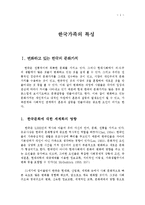





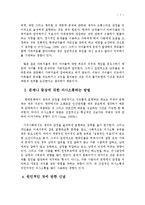

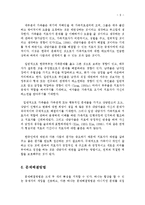

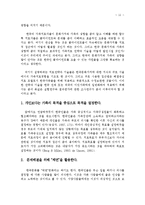


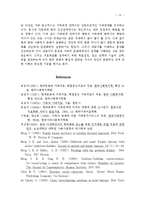
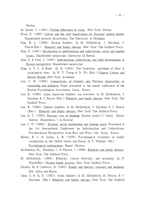

 분야
분야

